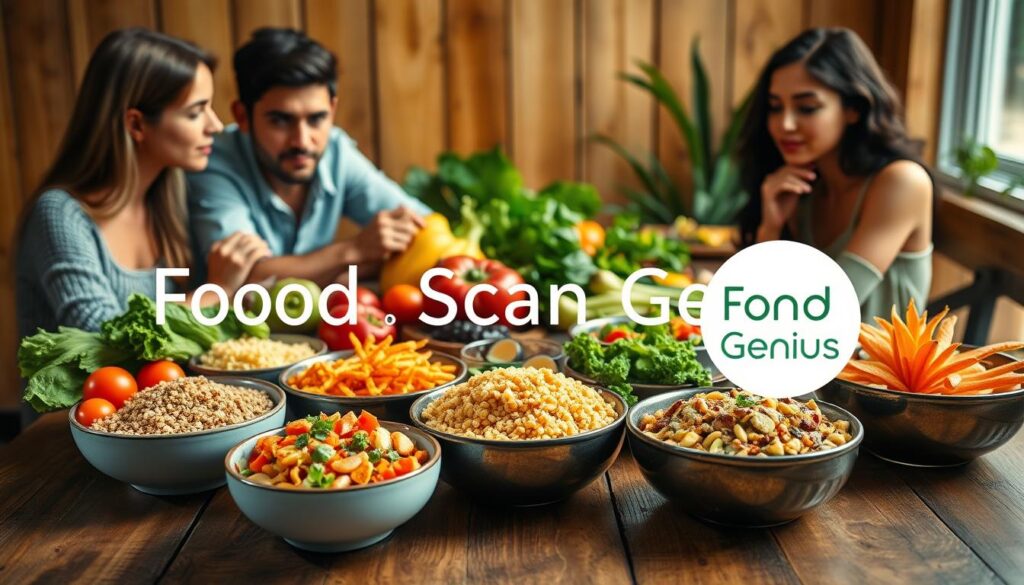Are you thinking about ditching meat for a greener option? You’re in the right spot, veggie-curious friends. Choosing a vegetarian lifestyle is more than a trend. It’s a choice that’s good for you and the planet. We’re here to help, with Food Scan Genius1 by your side.
Imagine walking through the grocery store, unsure about food labels. Then, Food Scan Genius appears on your phone. It uses AI to check ingredients and nutrition, making plant-based choices easy1.
But let’s start with the basics. We’ll explore the different ways to be vegetarian. Whether you’re just starting or going all in, we’ve got lots of info, inspiring stories, and tips. It’s like getting a smooth ride with a ripe avocado2.
Key Takeaways
- Vegetarianism is a lifestyle choice with numerous health and environmental benefits.
- The Food Scan Genius app can simplify grocery shopping and help you make informed, plant-based decisions.
- This guide will provide a comprehensive overview of vegetarian diets, including their types, advantages, and practical tips for transitioning.
- Discover essential nutrients, meal planning strategies, and ways to overcome common challenges of going vegetarian.
- Explore the myths and misconceptions surrounding vegetarianism and learn the truth.
Understanding Vegetarianism
Exploring the exciting world of plant-based living! Vegetarianism is a diet that doesn’t include meat, poultry, or seafood. But did you know there’s a wide range of veggie cuisine? From flexitarians who sometimes eat meat to strict vegans who avoid all animal products, there are many delicious ways to live a vegetarian lifestyle3.
What is Vegetarianism?
At its core, vegetarianism means not eating meat, poultry, or seafood. But it gets even more interesting3! Vegetarians can choose to include or exclude dairy, eggs, and other animal products. This leads to different types of diets. Whether you’re a lacto-ovo vegetarian, a pescatarian, or something in between, there’s a vegetarian option for everyone3.
Types of Vegetarian Diets
- Vegan: Avoids all animal products, including meat, poultry, seafood, dairy, and eggs.
- Lacto-vegetarian: Includes dairy products but excludes meat, poultry, seafood, and eggs.
- Lacto-ovo vegetarian: Includes dairy and eggs but excludes meat, poultry, and seafood.
- Semi-vegetarian: Occasionally includes small amounts of meat, poultry, or seafood.
- Pescatarian: Includes seafood but excludes meat and poultry.
Benefits of Going Vegetarian
Embracing a plant-forward diet has many benefits. Vegetarians eat fewer calories from fat, especially saturated fat, than non-vegetarians3. They also consume fewer calories and more fiber, potassium, and vitamin C3. Research shows vegetarians may have a lower risk of heart disease, type 2 diabetes, and some cancers4. Plus, plant-based diets have a lower carbon footprint than meat-based diets4.
It’s key to note that some vegetarian diets might need extra attention to get enough nutrients3. With careful meal planning, choosing nutrient-dense foods, and sometimes supplements, vegetarians can meet their nutritional needs3. By embracing a balanced plant-forward lifestyle, you can explore a world of delicious and nourishing foods354.
Going vegetarian is not just a dietary choice – it’s a lifestyle that can bring a world of benefits to your health, the environment, and your wallet!
Health Benefits of a Vegetarian Diet
Starting a vegetarian diet can bring many health benefits. It’s packed with nutrients, helps with weight control, and lowers disease risk. The benefits of eating plants are well-known6.
Nutritional Advantages
Vegetarian diets are full of vitamins, minerals, and antioxidants. These are found in foods like fruits, veggies, whole grains, legumes, and nuts6. These foods are key to keeping your body healthy and strong.
Weight Management
Going vegetarian can help with weight loss and keeping it off. A 2016 study found that plant-based diets can lead to weight loss7. People who eat plants tend to weigh less than those who eat meat, with vegans being the lightest8.
Reduced Disease Risk
Vegetarian diets can lower your risk of serious diseases. Research shows they help prevent heart disease, diabetes, and some cancers78. This is because they’re rich in nutrients that boost health and fight inflammation.
If you want to improve your heart health, manage your weight, or lower disease risk, a vegetarian diet is a great choice678.
Embracing a plant-based diet is not just a trend, but a lifestyle choice that can profoundly impact your health and well-being.” – Food Scan Genius, the world’s #1 AI assistant for shoppers with Food Allergies & Dietary Preferences.
Getting Started with Vegetarianism
Starting a plant-based diet might seem hard, but we’re here to help. You can jump in all at once or take it slow. With over 16 million Americans already vegetarian, you’re in good company9. There are many types of vegetarian diets to try, so find what fits your taste and lifestyle.
Transitioning Slowly
Starting slow is okay if you’re nervous. Begin by adding more plant-based meals to your week. This way, you’ll eat less meat and save money10. As you get more comfortable, you can try new recipes and keep your diet exciting.
Meal Planning Tips
Meal prep is crucial for a successful vegetarian diet11. Make sure to eat a variety of plant foods to get all the nutrients you need11. Include fiber-rich foods like beans and whole grains to stay full. Always talk to a dietitian or doctor for personalized advice on meal planning.
Finding Vegetarian Recipes
Trying new recipes is fun when you’re vegetarian! There are countless delicious options out there11. Choose faux meat products that are healthy and low in salt for the best results11. Use Food Scan Genius to make grocery shopping easier.
“Going vegetarian has been one of the best decisions I’ve ever made. The food is delicious, and I feel healthier than ever.” – Jane Doe, Vegetarian Lifestyle Enthusiast
Are you ready to start a plant-based diet? Follow these tips, and you’ll be a pro in no time. Enjoy the journey and get creative in the kitchen. Your taste buds and the planet will love you91110.
Essential Nutrients for Vegetarians
As a vegetarian, you might wonder, “But where do I get my protein?” Don’t worry, there are many tasty and healthy options. These will keep you strong and full. Let’s look at the key nutrients you need and where to find them12.
Protein Sources
Protein is vital, and you can get enough from plants. Legumes like lentils, beans, and chickpeas are great sources12. Whole grains, soy products, nuts, and seeds are also good. With a bit of creativity, you can meet your protein needs12.
Vitamins and Minerals
As a vegetarian, watch out for certain vitamins and minerals. Calcium is key for bones, found in dairy and plants like leafy greens12. Iron is important too, and vitamin C helps your body absorb it better12. Good sources include fortified cereals, beans, and nuts12.
Vitamin B12 is a challenge for vegetarians, found mainly in animal products13. Eat B12-fortified foods or take supplements to get enough13. Vitamin D is also crucial, and you can find it in fortified milks, eggs, and mushrooms12.
Supplements to Consider
Even with a good diet, supplements might be needed. Vitamin B12 and D supplements can help, especially if you don’t eat fortified foods13. Omega-3s, like DHA, are important for your brain and can be found in flaxseeds, walnuts, and algae supplements13.
For a balanced diet, eat a variety of plant-based foods. Try new recipes and mix different ingredients. With some creativity, you can meet all your nutritional needs as a vegetarian12.
Shopping for Vegetarian Ingredients
Going to the grocery store as a vegetarian can seem daunting. But don’t worry, we’re here to help! Let’s explore the aisles and find the best spots for plant-based staples14.
Where to Buy Vegetarian Foods
Your local supermarket is a great place to start. They have special sections for vegetarian and vegan products. Look for the natural food aisles for whole grains, legumes, and meatless proteins15.
Don’t miss the produce section for fresh fruits and veggies. Also, check the dairy aisle for vegetarian-friendly milk, yogurt, and cheese alternatives14.
Reading Labels Effectively
Understanding food labels is key to vegetarian shopping. Look out for hidden animal-derived ingredients like gelatin, whey, or casein. The Food Scan Genius app is super helpful, making it easy to find vegetarian options14.
With just a few taps, you can fill your cart with plant-based foods.
Budget-Friendly Shopping Tips
Eating vegetarian doesn’t have to be expensive. Buy items like dried beans, lentils, and whole grains, which are affordable and versatile16. Choose seasonal produce for freshness and value, and consider frozen fruits and veggies for nutrition14.
With a bit of creativity, you can make tasty, budget-friendly vegetarian meals. Your wallet and taste buds will thank you.
Being prepared is the secret to a successful vegetarian shopping trip. Carry a handy vegetarian grocery list and let’s tackle those aisles together. Happy, plant-based shopping!
Eating a variety of fruits, vegetables, whole grains, and plant-based proteins is the foundation of a healthy vegetarian diet.” – Registered Dietitian
Cooking Techniques for Vegetarian Meals
Start your vegetarian cooking journey! Whether you’re new or experienced, we’re here to help. We’ll share simple yet powerful techniques to make your meatless meals shine. Get ready to become a vegetarian cooking master!
Simple Cooking Methods
Learning basic cooking techniques is key to making tasty vegetarian dishes. Start with sautéing, roasting, and steaming. Sautéing veggies in oil or broth makes them sweet and tender. Roasting at high heat caramelizes their sugars, adding deep flavor. And steaming keeps veggies colorful and crisp17.
Flavoring Without Meat
Meatless meals can be just as flavorful. Use spices, herbs, and other plant-based ingredients for bold flavors. Try spices like cumin, chili powder, or curry powder. Fresh herbs like basil, cilantro, or rosemary add a burst of flavor. Don’t forget soy sauce, miso, or nutritional yeast for umami1718.
Preparing Quick Meals
Quick vegetarian meals are perfect for busy nights. Use pantry staples like canned beans, lentils, or frozen veggies. Stir-fries, grain bowls, and pasta dishes are great options. With a bit of prep, you can make these meals in 30 minutes or less19.

“The true sign of intelligence is not knowledge but imagination.” – Albert Einstein
| Cooking Technique | Benefits | Tips |
|---|---|---|
| Sautéing | Brings out natural sweetness, adds texture | Use a bit of oil or broth, cook over medium-high heat |
| Roasting | Caramelizes sugars, creates rich flavors | Preheat oven to 400°F, toss veggies in oil and seasonings |
| Steaming | Preserves vibrant colors, tender-crisp texture | Use a steamer basket or pot with a small amount of water |
Ready to elevate your vegetarian cooking? With these techniques, you’ll soon be making amazing meatless dishes. Explore plant-based ingredients, get creative with flavors, and enjoy the journey to becoming a vegetarian cooking pro171918!
Overcoming Common Challenges
Starting a vegetarian or vegan diet can be tough, but we’re here to help. Whether you’re eating out, dealing with social situations, or fighting meat cravings, we’ve got tips for you. These will keep you on track with your plant-based lifestyle20.
Dining Out as a Vegetarian
Eating out as a vegetarian can be tricky, but it’s doable. Look up the menu online before you go. This way, you can find vegetarian options easily. If you need to, ask the server to make changes to fit your diet. Many places are now happy to do this20.
Addressing Social Situations
Dealing with family and friends can be challenging for vegetarians. If they ask about your diet, be open and confident. Share why you chose to be vegetarian in a positive way21. Surround yourself with people who support your choices. It’s okay to say no to foods that don’t fit your values.
Combating Cravings
It’s hard to stop eating meat, especially at first. When cravings strike, try vegetarian options like plant-based burgers or sausages21. Find new vegetarian recipes that you love. Keep healthy snacks ready to stop cravings quickly. With time, these cravings will get easier to handle.
You’re not alone in this journey! Look for online communities, join local vegetarian groups, and talk to a registered dietitian20. Together, we can face challenges and enjoy the benefits of a vegetarian lifestyle.
“The greatest weapon against stress is our ability to choose one thought over another.” – William James
Myths and Misconceptions About Vegetarianism
Vegetarian and plant-based diets are becoming more popular. It’s important to clear up common myths and misconceptions. Let’s explore the truth behind vegetarian living.
Common Myths Explained
Many think vegetarian diets lack protein. But, there are many plant-based protein sources like seitan, tofu, lentils, and beans22. With a well-planned diet, vegetarians can get enough protein.
Some believe soy-based foods raise breast cancer risk. However, the American Cancer Society says traditional soy foods might lower breast cancer risk, especially in Asian women22.
Debunking Misconceptions
Some think vegetarian or vegan diets are always healthier. While they can be, it’s important to choose high-quality foods and watch out for saturated fat, added sugars, and sodium23. A balanced plant-based diet is nutritious but requires careful choices.
Another myth is that vegetarians and vegans can’t get enough calcium and vitamin B12. But, there are many plant-based sources, including fortified foods and leafy greens, and supplements when needed2223.
Understanding Cultural Perspectives
Vegetarianism is rooted in many cultures worldwide. In India, for example, it has been a part of the culture for centuries, with a rich culinary tradition24. Many religious and spiritual practices also embrace plant-based eating.
Exploring myths and misconceptions about vegetarianism shows it’s not just sustainable but also deeply rooted in culture. By understanding the facts and embracing the nuances of vegetarian living, we can foster a more inclusive and informed view of this lifestyle choice.

| Myth | Fact |
|---|---|
| Vegetarian diets lack protein | There are numerous plant-based protein sources, such as seitan, tofu, lentils, and beans22. |
| Soy increases breast cancer risk | Traditional soy foods may actually lower the risk of breast cancer, especially among Asian women22. |
| Vegetarian diets are automatically healthier | The quality of the foods consumed, as well as the levels of saturated fat, added sugars, and sodium, are key factors23. |
| Vegetarians and vegans struggle with nutrients | There are numerous plant-based sources of essential nutrients like calcium and vitamin B12, as well as fortified foods and supplements2223. |
“Vegetarianism has deep roots in many cultural traditions around the world, with a rich culinary heritage to draw from.”24
Resources for Vegetarian Living
Your plant-based journey just got easier! We’ve got a lot of resources to help you live a vegetarian lifestyle. You’ll find inspiring books, blogs, online communities, and local groups to support you.
Recommended Books and Blogs
Start your vegetarian journey with these essential books and blogs. They offer delicious recipes, helpful tips, and the latest in plant-based living25. Whether you’re new to vegetarianism or already a fan, these resources will be your top picks.
Online Communities and Forums
Join our online vegetarian community to connect with people worldwide. Share recipes, tips, and support each other in plant-based living6. You’ll find Facebook groups and forums filled with vegetarians ready to help.
Local Vegetarian Organizations
Discover vegetarian groups in your area. They offer events, cooking classes, advocacy, and support25. Meet other vegetarians and find great places to eat and shop.
Don’t forget to download the Food Scan Genius app. It’s your guide for vegetarian shopping and dining25. With its AI scanning and vast food database, you’ll make easy choices and enjoy vegetarian meals anywhere.
FAQ
What is vegetarianism?
Vegetarianism means not eating meat, poultry, or seafood. Instead, vegetarians eat plants like fruits, veggies, grains, and nuts.
What are the different types of vegetarian diets?
There are many vegetarian diets. Some eat meat sometimes (flexitarian). Others avoid meat but eat dairy and eggs (lacto-ovo vegetarian). There’s also veganism, where no animal products are eaten.
What are the benefits of going vegetarian?
Being vegetarian can make you healthier and better for the planet. It can also save money. A good vegetarian diet gives you all the nutrients you need and helps you lose weight without counting calories.
It might also lower your risk of heart disease, diabetes, and some cancers.
How can I transition to a vegetarian diet?
You can start being vegetarian slowly or all at once. Add more plant-based foods to your meals. Plan your meals to get all the nutrients you need. Try new vegetarian recipes.
The Food Scan Genius app can help you during this time.
Where do vegetarians get their protein?
Vegetarians get protein from plants like legumes, nuts, and grains. It’s key to eat a balanced diet. You might need supplements for protein and other nutrients.
How can I navigate shopping for vegetarian ingredients?
When shopping for vegetarian food, read labels well. The Food Scan Genius app helps with this. Knowing your local grocery store also helps.
What are some effective cooking techniques for vegetarian meals?
Cooking vegetarian meals can be tasty with the right methods. Use herbs and spices to add flavor. Try roasting, sautéing, and stir-frying to enhance flavors.
Meal prep and knowing quick recipes makes cooking easier.
How can I overcome common challenges of being a vegetarian?
Dealing with social situations and cravings can be tough. Talk about your diet with friends and family. Find vegetarian-friendly restaurants and keep healthy snacks ready.
What are some common myths and misconceptions about vegetarianism?
Many people think vegetarians don’t get enough protein or that it’s expensive. But, a well-planned vegetarian diet is full of nutrients. It’s not hard or expensive.
What resources are available to support my vegetarian lifestyle?
There are many resources for vegetarians, like books and blogs. Online communities and local groups also help. The Food Scan Genius app is useful for shopping and dining.
Connecting with others who are vegetarian can give you support and motivation.
Source Links
- Plant-Based Diet for Beginners: Your Guide to Getting Started
- Your Step-By-Step Guide to Going Plant-Based
- Vegetarian diet: MedlinePlus Medical Encyclopedia
- Digging a Vegetarian Diet
- The vegetarian diet
- Vegetarian diet: How to get the best nutrition
- Vegetarian diet: Benefits, risks, and tips
- Vegetarian and vegan diets: benefits and drawbacks
- The Ultimate Beginner’s Guide to Going Vegetarian
- Vegetarian, Vegan and Meatless Meals
- The Beginner’s Guide to Adopting a Vegetarian Diet
- Food Sources of 5 Important Nutrients for Vegetarians
- 7 Nutrients You Can’t Get from Plants
- Vegetarian Grocery List and Shopping Tips from a Registered Dietitian
- Vegetarian Diet Food List (+ Shopping List and PDF) – Listonic
- 101+ Vegan Grocery List Items (With Discounts)!
- Cooking Tips for New Vegetarians
- How to Ease Into Meatless Eating, According to Cooks Who’ve Actually Done It
- Healthy Cooking Skills Every Vegan Should Know
- How to Maintain a Balanced Diet as a Vegetarian or Vegan
- Foods for Plant-Based Diets: Challenges and Innovations
- 8 myths about vegetarian and vegan diets
- Building a Healthy Vegetarian Diet: Myths and Facts
- 7 Vegan and Vegetarian Myths, Busted
- No title found






5 Comments
[…] plant-based diet focuses on foods from plants like fruits, vegetables, and whole grains. It also includes legumes, […]
[…] term “vegan” was first used in 1944 by UK non-dairy vegetarians. They wanted to be different from those who still ate […]
[…] Test Kitchen The Complete Vegetarian Cookbook: 700 foolproof recipes with pescatarian-friendly […]
[…] platforms that make healthy eating […]
[…] for labs. They’re shaping the way we approach food safety in everyday life. For instance, the Food Scan Genius app uses similar principles to scan labels and ensure your meals are […]